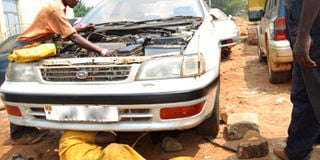How to find genuine car parts

Mechanics overhauling the engine of a car. For the safety of your car, it is advisable to buy spare parts from an authorised dealership. PHOTO BY GILLIAN NANTUME.
Many times people buy spare parts, used or new, from shops and walk or drive away without checking for defaults, only to realise later that what they have bought has a number of flaws. There are several things to consider before buying spare parts for your car.
Vehicle Identification Number
According to Ali Rahman of Kiwa Auto Spare Parts, it is important to have your Vehicle Identification Number (VIN) whenever you think of buying a spare part to avoid losing money. “This number gives the car parts seller information about your car such as the year, make and model. VIN is especially important when you want to buy engines and transmissions.”
The VIN is the identifying code for a particular car. The VIN can be used to track recalls, registrations, warranty claims, thefts, and insurance coverage.
The 17 digit VIN is found at the corner of the dashboard, inside the driver’s door on a factory sticker, inside the passenger door, trunk, hood, and sometimes, on the engine.
Know your engine prefix
Elizabeth Nakiganda of Ddungu Spare Parts, says, “Knowing the type of engine in your car always comes in handy. You can find this (engine prefix) information written before the digits of the engine number or on the side.”
Verify genuineness of spare parts
Nakiganda adds that buyers should use the professional expertise of a mechanic to verify the spare parts they are buying. “Buying and fitting counterfeit spare parts actually damage the car.”
She advises car owners to differentiate between genuine and fake parts by cross-referencing with the Original Equipment Manufacturer (OEM). “Check the product details such as part number, description, and compatibility information, as these aspects are difficult to overestimate in spare part purchase.”
Check for installation services
Rahman cautions against installing spare parts on your own, noting that some parts require technical knowledge and specific equipment or professional tuning. Instead get these services from the dealer or a professional mechanic.
Verify engine specifics
Some parts are unique to certain engine and transmission combinations, hence the need to verify what exactly is wrong with the car before purchasing the spare part. “Spare parts producers often try to create parts that work on a wide variety of vehicles. There are, however, some which are manufactured for specific car models and/or versions. This means one may have to complete some sort of modification to the part or vehicle before installation. By using OEM parts, one can be sure to fit the spare part without need for conducting modifications,” explains Rahman.
Know the seller
Buy spare parts from authorised dealers.
“Avoid getting hooked instantly on a deal that seems too good to pass up,” Rahman advises. “Get to know who your spare parts dealer is, what they supply, and what chances you have of getting redress in case you have a problem with a purchased part. It is not easy to get help from an unauthorised dealer.”
It is much easier to find new spare parts in an authorised dealership store. However, there are numerous dealers in used car spare parts in Kisekka Market, Katwe, Ndeeba, and Industrial Area.
Where to find VIN
Front of the engine block. Open the hood and look at the front of the engine.
Front of the car frame, near the container that holds windshield washer fluid.
Rear wheel well. Look up, directly above the tyre.
Inside the driver-side doorjamb. Look underneath where the side-view mirror would be located if the door was shut.
Driver-side doorpost. Look near the spot where the door latches, near the seatbelt return.
Underneath the spare tire.
Used vs new spare parts
Richard Kato, a sales personnel at Ali Agencies Limited, says, the most common spare parts on sale in Uganda are tyres, side mirrors, engine sensors, brake pads, battery, oil filters, shock absorbers, radiators, fuel pumps, headlights and tail light bulbs. “However, although most people buy used spare parts, it is better to buy new ones because the advantages last over the long term.”
There are both advantages and disadvantages of using new or used spare parts. Kato says that new spare parts are durable. However, he is quick to point out that new spare parts are expensive and can only be imported. “Used parts are cheap, easily accessible and solve problems in real time. They can easily be accessed at many places downtown. When buying them, though, be mindful of the fact that on some occasions they may not last and often cause damage to other parts of the car due to incompatibilities, plus wear and tear.”
He advises car owners not to buy the following spare parts if they are secondhand; air bags, air filter, ball joints, battery, brake discs/rotors, brake pads, clutch disc, distributor cap, engine bearings, fuel lines, fuses, gaskets, headlights, ignition coil, ignition points, oil filter, oil pressure switches sensors, piston rings, radiator hoses, rotor, shock absorbers, spark plug wires, spark plugs, thermostat, timing belt, timing chain, tyres, valves, water pump, water pump, and wheel bearings.
Buying spare parts online
Elizabeth Nakiganda of Ddungu Spare Parts, says people are buying cars and several spare parts through the internet and once you find what you need, just follow the prescribed steps to ease the process.
“Be careful while buying online to get the exact part ordered for. If you miss out something essential, you risk getting what you never asked for. Whereas online shopping is one way of easily getting spare parts, some online transactions are riddled with fraud, address mix-ups, and non-deliveries, so be mindful about the website you order your purchases from.”




